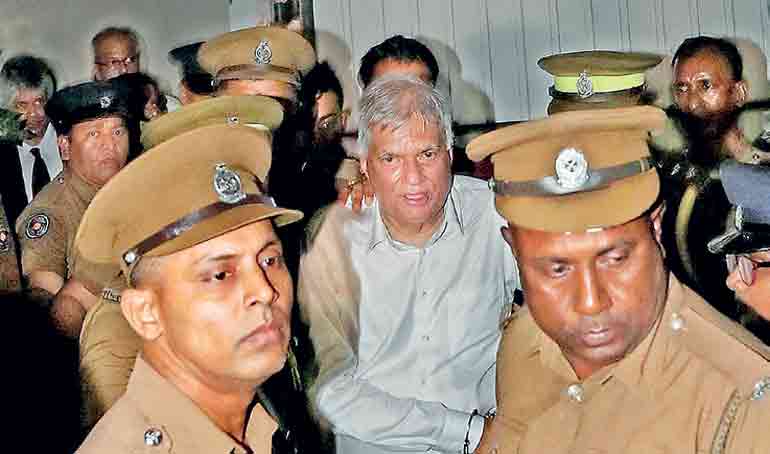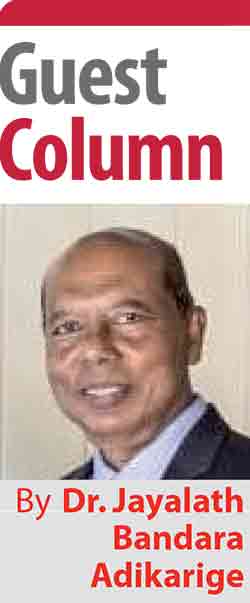Saturday Feb 21, 2026
Saturday Feb 21, 2026
Tuesday, 2 September 2025 00:43 - - {{hitsCtrl.values.hits}}

Far from being petty, the sight of Ranil in custody communicates the principle that no one is above the law
When former President Ranil Wickremesinghe emerged from hospital after securing bail, he did not walk out empty-handed. In his grasp was Boris Johnson’s flamboyantly titled memoir, Unleashed: The Political Memoir of the Century. The symbolism was hard to miss. Johnson, like Ranil, straddled the uneasy line between charm and scandal — a leader celebrated for wit and survival, yet dogged by questions of truth, ethics, and accountability. The book, bold and playful in style, promises candour while artfully skirting responsibility.
 That tableau — a former President accused of misusing Rs. 16.6 million of public funds for private travel, holding a memoir by another leader renowned for political indulgence — captures the very issue at stake.
That tableau — a former President accused of misusing Rs. 16.6 million of public funds for private travel, holding a memoir by another leader renowned for political indulgence — captures the very issue at stake.
Dr. Dayan Jayatilleka, in his Daily FT column of 29 August (https://www.ft.lk/dayan_jayatilleka/Ranil-s-arrest-political-ethics-and-seeing-this-administration-s-true-face/10527-780857), argued that prosecuting Ranil is “petty” and ethically wrong, given his supposed role in stabilising Sri Lanka’s economy1. But accountability, properly understood, is never petty. It is the lifeblood of democracy: the refusal to excuse indulgence on the grounds of past service, the insistence that public office is not a licence for private privilege.
The doctrine of impunity
Dayan’s defence rests on a troubling premise: that once a leader has rendered “great service,” the misuse of public resources becomes forgivable. Ranil stabilised the economy after 2022, therefore prosecuting him for diverting Consolidated Fund resources is petty. Mahinda Rajapaksa defeated the LTTE, therefore his lifetime luxuries at public expense are justifiable. By this logic, Dayan himself, as diplomat, could lavish State resources abroad because it was for the “greater good.” This is not an ethic of accountability. It is a doctrine of impunity.
Handcuffs and standards
Dayan condemns the image of Ranil in handcuffs as “a blunder.” But why should it be? If ordinary citizens are remanded for misuse of public property, is it not more — not less — important that those at the very apex of power are held to the same standard? Leaders who preside over austerity programs that squeeze households should be doubly careful not to misuse public funds. Far from being petty, the sight of Ranil in custody communicates the principle that no one is above the law.
Legality and legitimacy
Dayan invokes a distinction between legality and legitimacy, borrowed from his father. Yet he misapplies it. Legitimacy is not achieved by shielding former presidents from consequence because of past service. On the contrary, legitimacy is secured precisely by applying legal standards evenly. To demand that citizens comply with IMF-driven austerity while leaders quietly divert funds for personal benefit is the very definition of illegitimacy.
The charge of hypocrisy
Dayan accuses the NPP of hypocrisy: continuing Ranil’s IMF program while prosecuting Ranil himself. Yet the greater hypocrisy lies in excusing elite misconduct on grounds of past contribution. Service to the nation cannot be a licence to plunder it. This mindset entrenched Sri Lanka’s political decay.
Global standards of accountability
Dayan warns that Ranil’s prosecution is Caesar crossing the Rubicon — the end of a republic. Yet history suggests the opposite: it is refusal to prosecute elites that corrodes republics.
Consider the United Kingdom. Boris Johnson worked hard during the pandemic, yet his flouting of COVID rules made him the first prime minister found to have broken the law while in office. He paid a fine and resigned under pressure2. His downfall was not petty but principled: rules applied at the top.
In Hong Kong, senior officials were forced to resign for attending a birthday banquet that violated pandemic restrictions3. In Scotland, MP Margaret Ferrier was criminally convicted and suspended for breaching travel rules4. These were not vindictive excesses but essential signals that public trust requires accountability.
Ethics and proportionality
Dayan claims that Ranil’s stabilisation of the economy outweighs the Rs. 16.6 million misuse. But this inverts ethics. If those who “saved” the nation are free to encroach on public funds, accountability is meaningless. Proportionality requires the opposite: that leaders embody restraint, modelling the very discipline they ask of citizens. Service cannot be turned into a shield against scrutiny.
Courtesy without justice
Dayan highlights civility: Mahinda visiting Ranil in custody, Namal expressing solidarity. Yet gestures of courtesy cannot erase years of debt mismanagement that bankrupted the State. Sri Lanka’s collapse was fuelled by precisely this pattern: elite indulgence disguised as sacrifice, followed by token accountability. What is truly petty is not real accountability but its theatre — polite rituals without substance.
The “elder statesman” fallacy
Dayan suggests Ranil should remain as elder statesman. But what example does an elder who treats public funds as expendable set for the younger generation? Eldership without integrity corrupts political culture. Opposition unity is needed, yes — but founded on accountability, not nostalgia for impunity.
Selective justice, selective memory
Dayan praises the bipartisan elite for their “tolerance” toward the JVP after its insurrections. Yet this tolerance entrenched selective justice: ruthlessness toward dissenters, indulgence toward insiders. That same dynamic enabled the Rajapaksa era’s excesses and today’s culture of entitlement. Sri Lanka does not need elite tolerance for misconduct. It needs equal responsibility before the law.
Dayan claims that Ranil’s stabilisation of the economy outweighs the Rs. 16.6 million misuse. But this inverts ethics. If those who “saved” the nation are free to encroach on public funds, accountability is meaningless. Proportionality requires the opposite: that leaders embody restraint, modelling the very discipline they ask of citizens. Service cannot be turned into a shield against scrutiny
Accountability as the greater good
Dayan portrays Ranil as victim of overkill. But the true victims of excess are citizens whose futures were mortgaged by cycles of elite indulgence. To excuse misconduct because of “service rendered” is to perpetuate impunity.
Global examples — Johnson in Britain, Hong Kong officials, Scottish MPs — demonstrate that accountability is not petty but foundational. The greater good is not served by indulgence. It is served by the principle that no service, no victory in war, no stabilisation in peace, places a leader above the law.
That is the ethic Sri Lanka desperately needs. And that is the ethic commentators must stop belittling as “petty.”
Justice for Batalanda and beyond
Ranil Wickremesinghe’s arrest has also re-opened older wounds. For the families of the Batalanda victims, long dismissed as collateral in the State’s war against insurgency, the demand for justice has regained urgency. The Batalanda Commission (1995–1998) concluded that Ranil, as MP for Kelaniya, bore indirect political responsibility for the operation of detention and torture centres at the Batalanda Housing Scheme. It cited his unauthorised involvement in police activities and recommended further criminal investigation. While it had no authority to revoke civic rights, its findings cast a long shadow over his political legitimacy5. With his current arrest, survivors and families rightly ask: if justice is not delivered now, when will it ever be?
Nor can Sri Lanka ignore the Central Bank bond scam of 2015, which drained over Rs. 11 billion from public coffers. Ranil’s appointment of Arjuna Mahendran, his close associate and a foreign citizen, enabled the largest financial fraud in the country’s post-independence history. Mahendran fled, never to return. Ordinary citizens bore the consequences in an economy already buckling under debt6.
Added to this is the gas procurement scandal, exposed by the Auditor General in 2022–23. After Cabinet had already approved the award of a lower-cost tender to Siam Gas — backed by World Bank funds — the decision was abruptly overturned, and the contract was handed instead to OQ Trading at a higher price. The outcome was a loss of Rs. 1.139 billion, plus Rs. 210 million in demurrage charges7. A cheaper, internationally financed option was abandoned in favour of an expensive alternative, with no accountability for the waste.
These three scandals — one of blood, another of money, and the third of squandered resources — are not peripheral. They go to the very heart of public trust. If a nation cannot hold its leaders accountable for state violence, financial betrayal, and deliberate wastage of public resources, then “legitimacy” is nothing more than a mask for impunity.
Sri Lanka deserves better. Accountability is not a matter of political convenience. It is the republic’s backbone, and it extends not just to Rs. 16.6 million in travel funds, but to billions lost through bond fraud, billions more through reckless procurement, and, most gravely, to the countless lives erased in places like Batalanda. Nor can reconciliation be credible while the victims of the war — especially Tamil citizens who still wait for justice for disappearances, killings, and displacement — are left unheard8. Until these wounds, Sinhala and Tamil alike, are addressed with justice, there can be no true stability, no genuine reconciliation, and no republic worthy of its name.
Footnotes:
1 Dr. Dayan Jayatilleka, “Ranil’s Arrest: A Petty Act with Grave Consequences,” Daily FT, 29 August 2025.
2 Boris Johnson pays ‘Partygate’ fine, first British PM sanctioned for breaking the law in office, Vanity Fair, 12 April 2022.
3 Hong Kong officials face backlash over ‘partygate’ scandal during COVID restrictions, Wikipedia summary, accessed August 2025.
4 Margaret Ferrier MP suspended from Parliament after COVID rule breach conviction, Wikipedia summary, accessed August 2025.
5 Report of the Batalanda Commission of Inquiry (1998); see also Sri Lankan government tables Batalanda Commission report, Tamil Guardian, 6 March 2025.
6 Report of the Commission of Inquiry into the Central Bank Bond Issue (2015); see also Central Bank of Sri Lanka bond scandal, Wikipedia summary, accessed August 2025.
7 Auditor General’s Special Report on LPG Procurement (2022–23); see also The Morning, “Government loses Rs. 1.138 billion from OQ gas purchase,” 2023.
8 Report of the OHCHR Investigation on Sri Lanka (OISL), UN Human Rights Council, A/HRC/30/CRP.2, September 2015.
(The writer is a former academic at the University of Peradeniya with expertise in Sri Lanka’s political economy. His doctoral research focused on the country’s relations with the IMF and World Bank between 1960 and 1985. He currently researches the erosion of judicial independence and the rule of law in Sri Lanka, examining broader patterns of institutional decline. [email protected].)